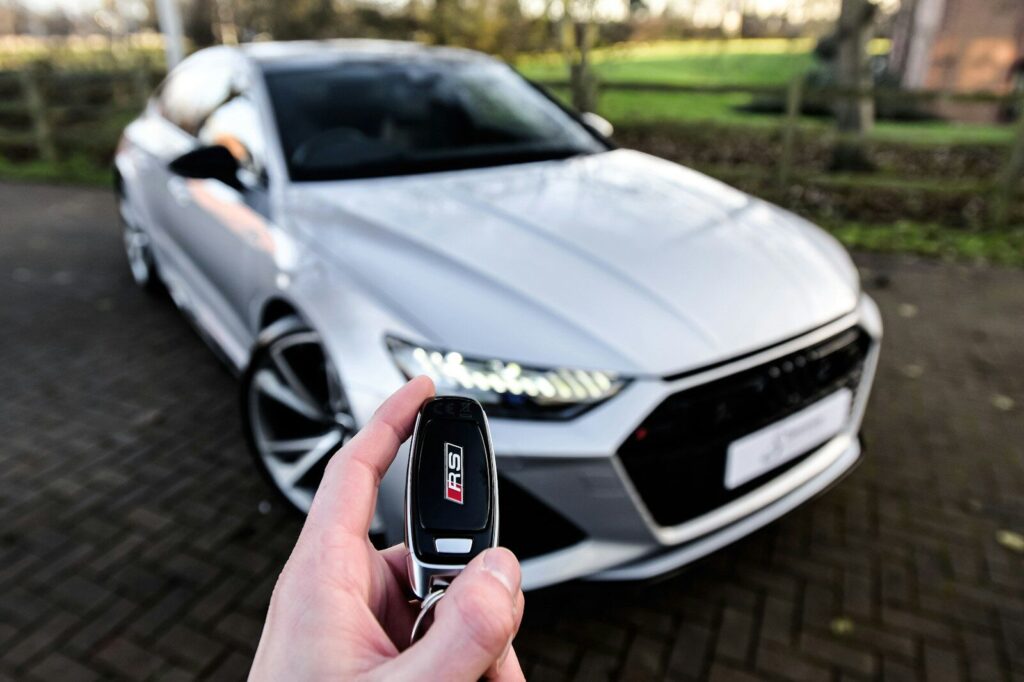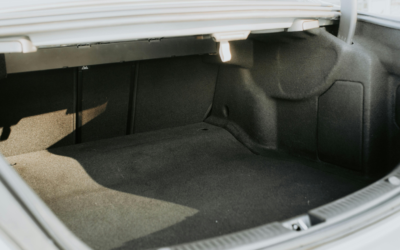How much car can I afford?
Are you dreaming of a new car but unsure how much you can afford in car costs? Purchasing a car is a significant financial decision, and making the right choice goes beyond just the sticker price. From a monthly new car payment to insurance costs and the overall cost of the car, understanding the total costs of owning a car is crucial.
By the end of this guide, you’ll learn how to determine your car budget, evaluate factors like down payments, interest rates, and trade-ins, and confidently enter the car buying process. Whether you’re looking for a new car, used car, or luxury vehicle, this article will help you make an informed choice.

Photo by Swansway Motor Group on Unsplash
Why Buying a Car Is a Huge Decision
Purchasing a car is more than just a financial commitment—it’s a life-changing decision that can impact many aspects of your daily routine and long-term planning. Here are some of the key reasons why buying a car is such a significant milestone:
1. Financial Investment
Cars are one of the largest purchases most people make, second only to buying a home. From the initial cost to ongoing expenses like fuel, maintenance, insurance, and potential repairs, owning a car requires careful budgeting and financial preparation.
2. Long-Term Commitment
A car is not just a short-term purchase; it’s a long-term responsibility. Most people own their vehicles for many years, and ensuring that it suits your future needs—such as expanding your family or changing your daily commute—is crucial.
3. Lifestyle Impact
The type of vehicle you choose can shape your lifestyle. For example, opting for a fuel-efficient compact car may be ideal for city dwellers who value convenience and savings, while a rugged SUV might be better suited for outdoor enthusiasts or families needing extra space.
4. Emotional Significance
For many, buying a car represents independence and freedom. Whether it’s your first vehicle or an upgrade, it’s a milestone that often marks significant life stages, such as entering adulthood, starting a family, or achieving financial stability.
5. Environmental Considerations
Today, many buyers weigh the environmental impact of their purchase, choosing between traditional gasoline-powered vehicles, hybrids, or electric cars. The decision can reflect your commitment to sustainability and influence your carbon footprint.
6. Resale and Depreciation
Cars typically depreciate in value over time, making it essential to think about resale value and future trade-in opportunities. Researching reliable models that hold their value can affect your long-term financial outlook.
Carefully considering all these factors helps ensure that your car purchase complements your financial situation, lifestyle, and priorities. Taking the time to evaluate your options will make this major decision more rewarding.
How to Determine How Much Car You Can Afford
The first step toward buying a car is understanding your budget. Use the following methods and calculations to figure out how much car you can afford based on your take-home pay and monthly expenses.
The 20/4/10 Rule
The 20/4/10 rule is a popular guideline for determining how much car you can afford. Here’s how it works:
- 20% Down Payment. Aim for at least 20 percent of the car’s purchase price as a down payment, which means the advertised price, not the cost after negotiation. A larger down payment reduces the loan amount and monthly payment, saving you interest in the long run, plus you’ll have a smaller loan. You’ll even potentially cut the loan payment term down by a few months.
- 4-Year Loan Term. Opt for a car loan term no longer than four years. While longer loan terms may offer lower monthly payments, they often come with higher interest rates and increase the total cost of the loan, making an inexpensive car an expensive car. Save more money in the long run by having a short payment term.
- 10% of Monthly Income. Keep your total car expenses—including car payment, auto insurance, and maintenance costs—to no more than 10 percent of your monthly take-home pay. You want to calculate your monthly paycheck with after-tax pay, not with tax, as that’s less money you’re directly bringing in each month.
Example. If your monthly income after taxes is $4,000, your total car expenses should not exceed $400. With $400 allocated, you’ll need to account for fuel costs, insurance premiums, and registration fees when deciding on your monthly car payment.
Car Affordability Calculator – A Good Starting Point
To simplify calculations, use a car affordability calculator. Plug in your monthly income, desired monthly payment, loan term, and interest rate. The calculator will provide a clear picture of how much car you can afford based on your budget.
Total Costs to Consider for Car Affordability
The purchase price of a car is just one part of the equation. To avoid unexpected financial burdens, factor in these additional costs.
1. Down Payment and Trade-Ins
A larger down payment reduces your loan amount and monthly payment. The average down payment for a new car is typically around 10 to 20 percent of the sticker price. If you have an older vehicle to trade in, the net trade-in value can also go toward your down payment.
2. Monthly Car Payment And Car Loan Amount Details
Your monthly car payment depends on the loan amount, interest rate, and loan term. Shorter loan terms (e.g., 36 months) result in a smaller total loan but a higher monthly payment, while longer loan terms (e.g., 60 or 72 months) create lower payments but higher total costs due to interest.
3. Auto Insurance
Auto insurance is a significant part of your total car expenses. Insurance costs are based on various factors, including your driving history, credit history, location, and the type of car or luxury vehicle you choose. Get quotes from your insurance company ahead of time to estimate this expense.
4. Fuel and Maintenance Costs
Depending on the car’s fuel efficiency, fuel costs can vary greatly. Additionally, consider potential maintenance or repair expenses, especially if you’re purchasing a used car or an older vehicle. Newer cars may be more expensive upfront but can save you money on repairs over time.
5. Taxes and Fees
When budgeting for your next car, don’t forget sales tax, registration fees, and potential cash rebates for new vehicles. These expenses can significantly impact your upfront costs and, in some cases, your loan terms.
Tips to Make Your Car More Affordable
If you’re worried about stretching your budget too thin, these tips can help you save money and make your new car purchase more manageable:
Opt for a Lower-Priced Vehicle
While that luxury vehicle may be tempting, opting for a lower-priced car can free up room in your monthly budget. Consider prioritizing essential features over fancy add-ons.
Consider a Used Car
A used car or certified pre-owned vehicle is often more affordable than a brand-new vehicle. Plus, they typically have lower depreciation rates, meaning you’ll get better value for your money. Interest rates may be higher, but if you’re looking to buy an expensive vehicle, it’s your best bet to buy one that’s maybe a year old, with low mileage, and enjoy the financial benefits.
Shop for the Best Auto Loan Terms
Your interest rate greatly impacts the car loan payment. Those with high credit scores often qualify for better rates, so work on improving your credit history if needed. Compare lenders to find the best deal and consider pre-approval for streamlined negotiations at the dealership.
Pros and Cons of New vs. Used Cars
When deciding between a new or used car, it’s important to weigh the advantages and disadvantages of each option carefully. Both come with unique benefits and challenges that can significantly impact your experience and finances.
Pros of a New Car
- Latest Features: New cars typically come equipped with the latest technology, safety features, and fuel-efficient engines.
- Warranty Coverage: Most new vehicles come with comprehensive manufacturer warranties, offering peace of mind against unexpected repairs.
- Customization Options: Buyers can customize their new car to their preferences, including color, trim, and added features.
Cons of a New Car
- Higher Cost: New cars are generally much more expensive than used ones, including taxes and fees.
- Rapid Depreciation: New cars lose a significant portion of their value within the first few years of ownership.
- Higher fuel and insurance costs and premiums: The cost of insuring a new car can be higher than that of a used vehicle.
Pros of a Used Car
- Affordability: Used cars are usually much cheaper than new vehicles, making them a better option for budget-conscious buyers.
- Slower Depreciation: A used car has already experienced the bulk of its depreciation, so its value tends to hold more steady.
- Lower Insurance Costs: Insurance rates for used cars are often lower than those for new cars.
Cons of a Used Car
- Potential for Repairs: Depending on the age and condition, used cars may require more frequent maintenance and repairs.
- Limited Features: Older models may not have the latest safety and technology features found in new cars.
- Unknown History: Even with vehicle history reports, there’s a chance of hidden issues or prior damage that wasn’t disclosed.
Carefully evaluating these pros and cons can help you choose the option that aligns best with your needs, budget, and personal preferences. Both new and used cars can be excellent choices depending on your circumstances.
Why Planning Your Car Purchase Matters
Failing to account for all costs when purchasing a car can lead to financial strain. By determining a realistic budget, considering total expenses, and making informed decisions, you’ll be better equipped to enjoy your vehicle purchase without stress.
Popular Car Makes and Their Websites
Here are just a few car manufacturers along with links to their official websites for more information:
- Toyota – www.toyota.com
- Honda – www.honda.com
- Ford – www.ford.com
- Chevrolet – www.chevrolet.com
- BMW – www.bmw.com
- Mercedes-Benz – www.mercedes-benz.com
- Tesla – www.tesla.com
These automakers are known for their quality, performance, and innovation, making them excellent choices to consider when purchasing a car.

Bring your new car to Love My Car Car Wash for cleaning and detailing maintenance!
Start Your Car Buying Process with Confidence | How Much Car Can I Afford
So, how much vehicle can you afford?
Understanding how much car you can afford is the key to a successful car buying process. With the help of these budgeting tips, you’re ready to make an informed decision for your next vehicle.
Want to simplify your calculations and finalize your budget? Use a car affordability calculator today to see exactly how much car you can afford based on your monthly take-home pay.





